The best vitamin C supplements
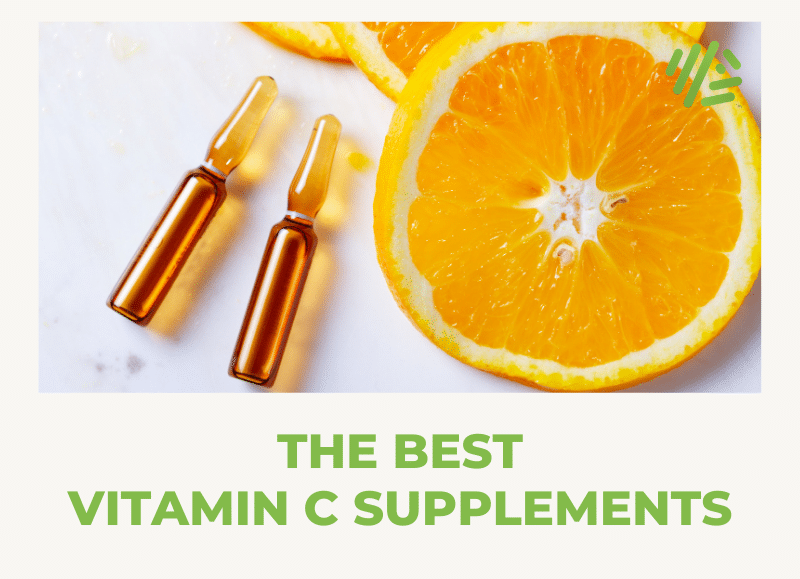
Contents
Vitamin C is a “scavenger antioxidant,” meaning its job is to mop up free radicals circulating in the body.1 This, in turn, helps to protect cells against oxidative damage.
We list Vitamin C several times in our guide to nutrigenomics, and I even use a Vitamin C shower filter to take the chlorine out of the water I bathe in.
In fact, I have a thriving fiddle-leaf fig tree in my living room whose life I owe to Vitamin C. Fiddle-leaf figs can’t handle any chlorine in their water supply or they’ll die, so you can’t water them with tap water. I water mine with my shower-filter water and it’s never been healthier.
So, yes, we believe that Vitamin C is an effective antioxidant. However, this isn’t a post about the health benefits of Vitamin C. This is a post about finding a high-quality brand of Vitamin C, which as we’ll find out may be more difficult than you might think. Not all Vitamin C is created equal. Approximately 80% of the world’s Vitamin C comes comes from China, where the manufacturing and quality controls aren’t as stringent as in the United States.footnote id=”2″] There is some concern that the Vitamin C we consume so much of in America, and that is often used as an additive in processed food, has been tainted with impurities such as heavy metals.
In this post, I interview an insider in the supplement industry to get his take on how to find high-quality Vitamin C products.
If you’d like to hear me talk to our Industry Insider live, we discuss how to find the best quality supplements in this episode of the Gene Food Podcast – Dissenting opinions on popular supplements, skip the collagen, metformin, omega-3 and more with our Industry Insider.
How to find the best Vitamin C supplement
Ascorbic acid bioavailability: does it vary by formula?
Despite what Dr. Google might tell you, there is very little difference between the different types of ascorbic acid as far as bioavailability is concerned. According to the Linus Pauling Institute at Oregon State University, considered one of the leading experts in Vitamin C research, natural and synthetic ascorbic acid are chemically identical and have the same effect on plasma ascorbic acid levels. The same can be said for powders vs. tablets/capsules/liquid/food. It appears that regardless of the delivery or the form, there is no statistically significant different impact on serum levels.
Quality is an entirely different conversation.
How is Vitamin C made? Are plant sources best?
If you want to know how Vitamin C is made, look no farther than the nearest corn field. The vast majority of supplemental Vitamin C as Ascorbic Acid is synthesized from corn-derived L-sorbose, as are many of the ascorbate salts. “Naturally” sourced Vitamin C in the supplemental form come from multiple sources including rose hips and/or acerola fruit. The challenge within the supplement industry and for the terms “whole food” or “natural” is that they are extremely misleading and used primarily for marketing purposes. This discussion can be an entire blog on its own, but the concern here is the true legitimacy of the claim.
The challenge with true “whole-food” supplements is dosing. It is impossible to achieve any sort of therapeutic dosing when using whole-food supplements. A quality acerola extract might be standardized at 17% Vitamin C. So every 100 mg of acerola extract would contain 17 mg of Vitamin C. We know that Vitamin C from acerola fruit and manufactured Vitamin C are bio equivalents. In this case, the whole-food approach is extremely inefficient, both from a dosing and cost perspective.
I do, however, agree that any China-sourced raw material would be a very desperate, last resort.
How can you tell whether Vitamin C is from a quality manufacturer?
This can be a challenge, as every dietary supplement company claims “Quality.” My two recommendations to follow when vetting supplement companies are:
- Does the company manufacture their own products or work closely with a reputable manufacturer? An alarming number of supplement companies have no control of the manufacturing process. These companies cannot legitimately claim “Quality” if they do not have a hand in raw material sourcing, manufacturing processes that adhere to GMP as defined by the FDA and the rigorous laboratory testing that should be done in order to guarantee purity and potency.
- Look for USP-grade raw materials. These letters will appear directly next to the ingredient in the supplement facts box. This means that the ingredient conforms to the standards set forth in monographs published by the United States Pharmacopeia (USP). These monographs exist for nearly every vitamin and describe all the specific physical and chemical properties of the ingredient, along with the specific testing methods required to ensure the ingredient conforms. These monographs are subject to continual revisions and it is the responsibility of the manufacture to verify their raw material against these monographs in order to label an ingredient as USP grade. Certificates of Analysis should be able to be available upon request to verify the legitimacy of the USP claim.
Is most Vitamin C made in China? Is this a quality problem?
Yes and yes. To my knowledge, there is only one major supplier of Vitamin C outside of China and that is a Scottish lab called DSM. Many of the challenges faced by the supplement industry today exist because of a loosely regulated supply chain. It is ultimately the responsibility of the manufacturer to verify the purity of a raw material before it is put into a product and distributed to sellers. In my opinion, buy your supplements from transparent manufacturers. If raw materials are responsibly soured, documentation of these sources should be easy to obtain and unless it is absolutely necessary, don’t buy products with China-sourced raw materials. Like most other industries, the notion “you get what you pay for” holds true to the supplement industry.
What about sodium and calcium ascorbate?
Sodium ascorbate and calcium ascorbate, like other mineral-bound ascorbates, are very similar to other types of ascorbates and offer similar bioavailability. Anecdotal evidence suggests that, at higher doses, minerally bound ascorbates are better tolerated than ascorbic acid because of the buffering effect of the mineral. There is no evidence to suggest better bioavailability in one over the other. Something to keep in mind: 1 mg of calcium ascorbate does not equal 1 mg of Vitamin C because of the calcium component. In some cases, it may be important to monitor mineral levels, like sodium, so inadvertently consuming sodium as sodium ascorbate may be an issue.
Rating popular Vitamin C supplements
OK, so based on our interview, we are looking for some knowledge of sourcing for raw materials, Good Manufacturing Practices (GMP) facilities, and USP-grade Vitamin C listed on the product label. Products like this should be easy to find, right?
Not so fast, my friend. Most Vitamin C products we looked at do not meet these requirements.
Vitamin C supplement comparison
| Brand | Product link | Food source | USP | Buffered | Quantity |
|---|---|---|---|---|---|
| Whole Foods Food-Sourced Vitamin C | View on Amazon | Y | N/A | N | 60 ct |
| Ortho Molecular Buffered C | View on Amazon | N | Y | Y | 90 ct |
| Solaray Vitamin C | View on Amazon | N | N | N | 250 ct |
| Nature's Way Vitamin C | View on Amazon | N | N | N | 100 ct |
Whole Foods Food Sourced Vitamin C (Recommended)
This is an interesting product. You can see a GMP certification right on the supplement label. The product is also organic and Vegan. The food source is Amla fruit, and Whole Foods is using a trademarked brand of Amla fruit Vitamin C called Orgen-C®. When you go to the Orgen-C® website, there is an immediate disclosure of how their Vitamin C is made.
Orgen-C® is Certified Organic Amla Extract standardized for 50% Organic & Natural Vitamin C. The remaining 50% is the co-factors and co-nutrients of the same Amla extract such as non-citrus bioflavonoids and polyphenols.
It appears that 50% of the product is organic Vitamin C from amla extract, and the remaining 50% is made from the extract of amla fruit, but not with organic materials. One of the concerns our industry insider listed in his interview was how “natural” food-sourced Vitamin C manufacturers would get enough Vitamin C from a food source. The implication was a natural product may contain 17% natural ingredients, with the rest synthetic filler. In this case, Whole Foods runs into this problem because the organic amla fruit extract only makes up 50% of the Vitamin C, and the total dose for one pill is 250 mg, which is 150 mg below the daily dose of Vitamin C recommended by the Linus Pauling Institute.
In our view, Whole Foods finds an adequate solution with a disclosure of where the rest of the ingredients come from (amla extract but not organic), and those wanting a higher dose can take 2 pills. The product is certified organic, and it doesn’t appear that it is fortified with any ascorbic acid that could contain heavy metals. We give it a thumbs up for transparency down the supply chain.
To see the Orgen-C® supply chain, click here.
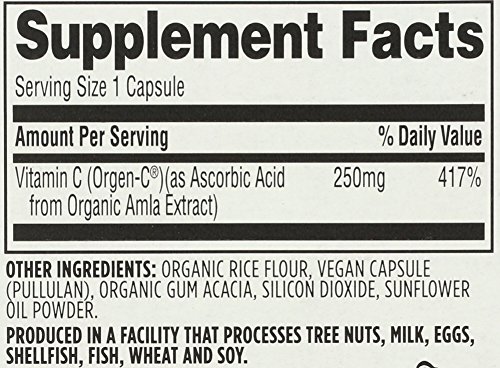
OrthoMolecular Buffered C capsules (Recommended)
This is a synthetic preparation, but one of the only supplements that lists USP-grade ascorbic acid (View on Amazon) on the label as our industry insider said it should be done. We like the buffered C because of the high-quality, USP-grade Vitamin C, as well as because of the mineral count, which tempers the acidity of straight Vitamin C. All the ingredients, including the minerals (calcium, magnesium, potassium), are USP grade. The Vitamin C dosing is also higher than with the Whole Foods product, at 700 mg with a 2-capsule dose. If you don’t tolerate acidic supplements and do better with a buffered Vitamin C product, this is a good choice.
The OrthoMolecular manufacturing facility is also GMP certified and FDA audited.
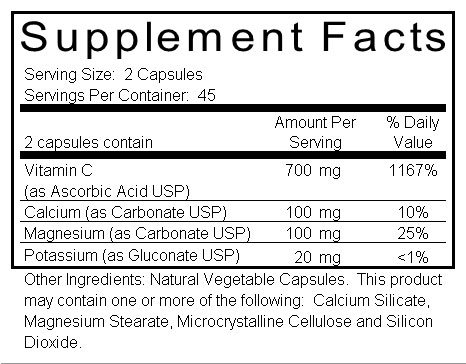
Solaray Vitamin C Two Staged Time Release (Not Recommended)
Solaray is known as a high-quality supplement brand that cares about quality, but there are better Vitamin C preparations out there than the Two Staged Time Release Product. The first thing you notice when reviewing the label is that the product is not food sourced, although it does include rose hips and acerola fruit in the blend, and the ascorbic acid is not USP grade.
In our view, none of these Vitamin C products are terribly expensive, so why risk ingesting ascorbic acid from a shady source when there are a handful of brands that use high-quality ingredients? We simply don’t know the origins of the ascorbic acid Solaray uses and therefore we cannot recommend this product at this time.
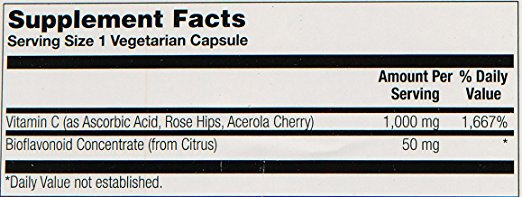
Nature’s Way Vitamin C 1,000 with Bioflavonoids (Not Recommended)
This Nature’s Way Vitamin C runs into the same problem as the Solaray formula — we don’t know where the ascorbic acid is sourced from, or its level of quality. The bioflavonoid blend does little to help, as we view these additives as little more than fluff used to bolster marketing. At a price point of just $7.30 for 100 capsules, it’s unlikely Nature’s Way is using a high-quality Vitamin C in this product.
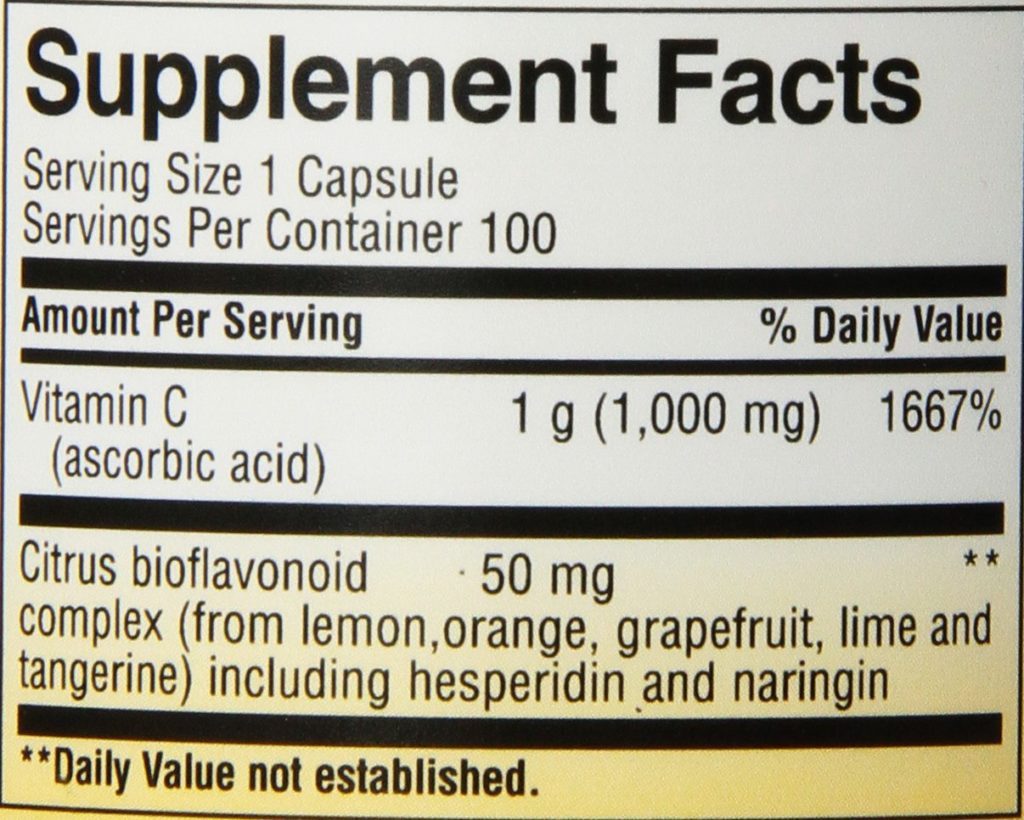
Key takeaways
The big takeaways here are that ascorbic acid is, in most cases, derived from corn, and when the product is made in China, we don’t know exactly what we are getting from a quality standpoint. Checking to make sure that your supplement manufacturer uses a GMP certified facility is important, but it doesn’t guarantee that the actual ascorbic acid they use in their formulas will be high quality.
To find a good-quality Vitamin C product, look for an all organic food based supplement, or a USP grade vitamin C.

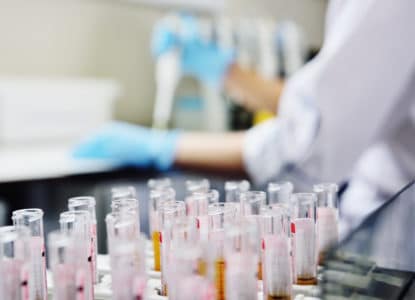
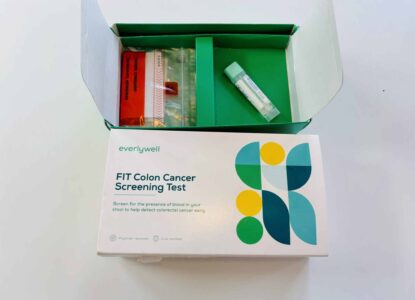

I’d also like to know if the Doctor’s Best Vitamin C with Quali-C is a good one to go with
We will add this to the list!
What do you think of:
– Garden of Life, Raw Vitamin C (500 mg whole food vit C with bioflavonoids) Certified B Corp.
– Nutrigold (240 mg plant based whole food C)
Thank you.
Garden of Life is usually a reliable brand, but we haven’t had the time to review those products specifically.
Hi, thanks for this article!
I want to know what do you think of doctor’s best vitamin C with quali- C Ascorbic Acid? It looks like their product is manufactured in Scotland as it says “Doctor’s best containe quali c which is manufactured in Scotland” and even DSM is mentioned. Let me know your thoughts on this product.
Here is the list of whole complex vitamin c brands:
1. Billy’s Infinity Vitamin C
2. Pure Radiance Synergy Vitamin C
3. North American Herb and Spice Purely C
….enjoy!
Can you recommend a Vitamin C Supplement that is not produced in a facility that processes wheat, milk, and soy- and also one that does not contain calcium, magnesium, and potassium? I have food sensitivities. The extra minerals I take in another supplement prescribed by my doctor.
Thank you!
Yellow bell peppers.